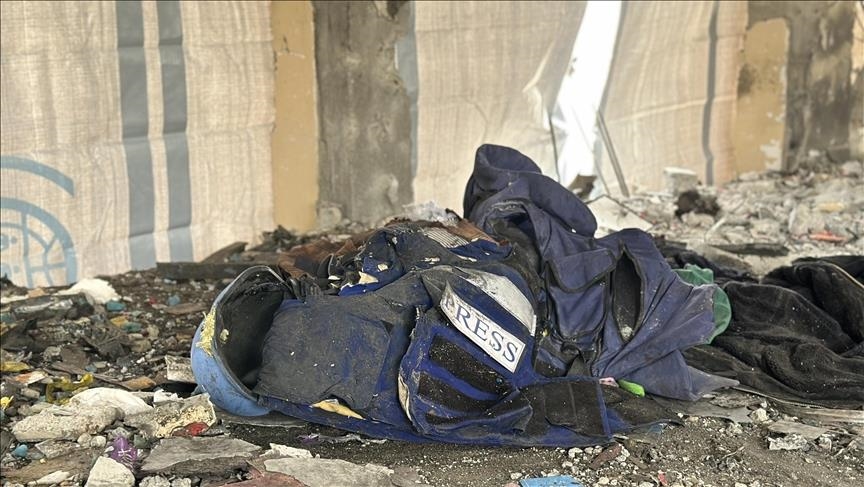
The number of journalists killed in Gaza since Oct. 7, 2023 is unprecedented in human history. More media workers have lost their lives in the Gaza war than in World War II, the Vietnam War or the 1990s conflicts in the former Yugoslavia. Tallies vary because of different counting methodologies. The International Federation of Journalists puts the toll at 148 deaths while others record a figure of over 200. For context, there were around 1,000 journalists working in Gaza at the start of 2023, so the mortality rate is significant. Of course, the overall toll in this war is horrendous; more than 45,000 have perished, according to the authorities in Gaza. However, the death toll among journalists is dramatically higher than that among any other occupational group.
Explaining such an extraordinary proportion of lost lives is necessarily speculative – but there are factors that are impossible to ignore. The Israeli Defense Forces have access to sophisticated monitoring equipment, such as Pegasus, which secretly infects mobile phones and discloses their precise locations. They have AI-powered systems known as “Lavender” and “Gospel” to select targets and program weapons systems to precise geo-locations. They also have a fleet of deadly drones.
Obstacles to reporting
Neither of these are the only circumstantial evidence that something terrible is in progress. International reporters have been barred from Gaza since the war’s outset. Foreign correspondents have repeatedly petitioned to pass through the Rafah crossing to witness events for themselves, and they have been consistently denied. The Foreign Press Association in Jerusalem has stated: “Never before has Israel enforced such a long and strict information blackout. It has repeatedly rejected our appeals for access, (and) fought us in court to uphold this draconian ban.”
During the same period, the Israeli daily paper Haaretz has been sanctioned by its own government, and the Qatari television station Al Jazeera has been banned from operating in both Israel and the West Bank. The most profound effect of this campaign is felt in Gaza, of course, but such an attack on free reporting has an impact all around the world.
Call for international action
As long as the Israeli government pursues such a policy, and is facilitated by its allies, it provides cover for all those around the world who would undermine media freedom. So, what then can be done by those of us who support free and unfettered journalism?
The first step is to recognize the extraordinary bravery of those who continue to report from Gaza. They deserve every form of support that we can provide. In recent months, the IFJ, working with UNESCO, has launched three journalists’ solidarity centers in Gaza where reporters work, recuperate, socialize and access training. Alongside many other agencies, the IFJ also directly aids journalists through their union, the Palestinian Journalists’ Syndicate. Anyone can support this work via the IFJ’s International Safety Fund.
No less important is the demand for an international investigation into what has happened to journalists in Gaza. Karim Khan, the chief prosecutor of the International Criminal Court has already announced that he has “reasonable grounds to believe that Benjamin Netanyahu and Yoav Gallant bear criminal responsibility for war crimes and crimes against humanity.” It is critical that Khan’s investigation progresses and that its findings are examined in a court of law. Only when this happens will there be a chance for Palestinians to start believing that international law protects them.
International law needs to be more accessible
Such a long wait for the ICC to take up this case – and previous crimes such as the killing of Shireen Abu Akleh in 2022 – makes it clear that obtaining international justice for journalists is a significant challenge. For this reason, the IFJ has long campaigned for a specific UN Convention on the Safety of Journalists. This would not create new rights, but would make international law more accessible when journalists are targeted. Adoption of such a Convention in the next few years will be of little comfort to those who have lost their lives in Gaza. It would, however, be a recognition of the service that journalists provide and the sacrifice that this often demands.
Without journalists, the people of the world would have little idea of how lives beyond their own neighborhoods are impacted by global events. Most of us may have cause to disagree with the perspectives of some or many individual journalists, but the more reporting is available to us, the more voices are heard, the better we will be able to make up our own minds about what is important. Emphasizing the international legal provisions that protect journalists will improve the safety for all – whether they work in war zones or at home alone.
The above piece is written by Tim Dawson who is the deputy general secretary of the International Federation of Journalists for Anadolu.








